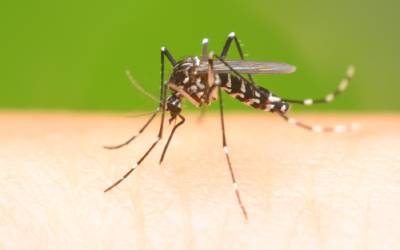
The Centers for Disease Control and Prevention (CDC) has recently given a health alert to people living in Florida and Texas. According to the CDC’s findings as of June 26, 2023, several cases of malaria have been identified within these states. To help you stay informed and protected, the professionals at Bug Out are here to provide you with essential information about the recent malaria health alert. In this blog, we will explain the nature of malaria, how it spreads, and the symptoms to watch out for. Additionally, we will offer valuable tips on how you can protect yourself and your family.
What Is Malaria, and Is It Dangerous?
Malaria is a disease that carries significant risks and can be life-threatening. It is transmitted to humans through mosquito bites. In the initial stages, it can resemble flu-like symptoms, including shivering, muscle pain, vomiting, and profound exhaustion. If left untreated, it can lead to severe complications like kidney failure, seizures, and other critical ailments.
Most individuals experience symptoms within four weeks after being bitten by an infected mosquito. However, some individuals may not exhibit signs of illness until much later, even up to a year after the initial infection. If you suspect you might be infected with malaria, it is crucial to seek immediate medical attention for diagnosis and treatment.
Is Malaria Common in the United States?
Worldwide, malaria is a common disease – particularly in tropical and subtropical regions. However, it is much less frequent in the United States, and is generally only picked up by travelers who have recently visited a destination where malaria is more common.
That’s why the most recent outbreak is so concerning; these are the first instances of malaria that have been locally transmitted by non-travelers since 2003. Though there have only been a few cases so far, it’s crucial that we take action to protect ourselves and contain the disease before it can spread even further.
How Does Malaria Spread?
Though many people worry that malaria can spread between individuals, it actually relies on infected mosquitoes as carriers. If an infected mosquito bites a person, they may contract the disease. For that reason, avoiding mosquitoes is the best way to protect yourself from this outbreak. Techniques you can use to prevent mosquito bites include:
- Reduce mosquito populations nearby: Minimize the number of mosquitoes around you to lower the chances of getting bitten. Start by eliminating even the smallest puddles in your yard, as mosquitoes breed in stagnant water. Check areas like gutters, playground equipment, landscaping, tools, and anywhere water might collect.
- Cover up with long-sleeved shirts and pants: Shield yourself by wearing long-sleeved shirts and pants. While some mosquitoes can bite through clothing, this provides an extra layer of protection.
- Avoid dawn and dusk outings: Mosquitoes are most active during dawn and dusk. Stay indoors during these times to avoid encountering large swarms and reduce the risk of getting bitten.
- Use mosquito nets and check screens: Prevent mosquitoes from entering your home by repairing any holes in door and window screens. Consider sleeping under a mosquito net for added protection. You can also use nets to cover your porch, allowing you to enjoy the outdoors without worrying about bites.
- Apply EPA-registered repellents: Look for repellents registered with the Environmental Protection Agency (EPA) to effectively keep mosquitoes and other pests at bay. Visit their website to find the right repellent for your needs and follow the instructions for safe application.
Protect Your Property with Professional Mosquito Control
Having mosquitoes buzzing around your backyard is never ideal, but right now, it’s potentially dangerous. While it may feel impossible to get rid of these pests, the experts at Bug Out are here to help. Our state-licensed technicians use Integrated Pest Management techniques to identify and treat the root cause of the problem, so you can get reliable and long-lasting results. To schedule your service, get in touch today!




